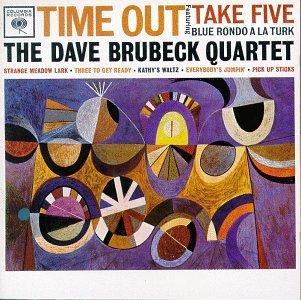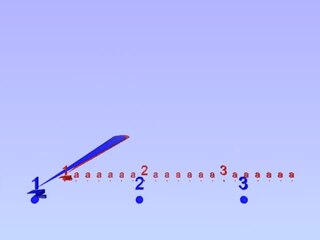Related Research Articles

David Warren Brubeck was an American jazz pianist and composer. Often regarded as a foremost exponent of cool jazz, Brubeck's work is characterized by unusual time signatures and superimposing contrasting rhythms, meters, tonalities, and combining different styles and genres, like classic, jazz, and blues.
Rhythm generally means a "movement marked by the regulated succession of strong and weak elements, or of opposite or different conditions". This general meaning of regular recurrence or pattern in time can apply to a wide variety of cyclical natural phenomena having a periodicity or frequency of anything from microseconds to several seconds ; to several minutes or hours, or, at the most extreme, even over many years.
A time signature is an indication in music notation that specifies how many note values of a particular type are contained in each measure (bar). The time signature indicates the meter of a musical movement at the bar level.

In music, metre or meter refers to regularly recurring patterns and accents such as bars and beats. Unlike rhythm, metric onsets are not necessarily sounded, but are nevertheless implied by the performer and expected by the listener.
In music, the terms additive and divisive are used to distinguish two types of both rhythm and meter:

Čoček is a musical genre and dance that emerged in the Balkans during the early 19th century. It features prominently in the repertoire of many Romani brass bands.
Balkan music is a type of music found in the Balkan region of southeastern Europe. The music is characterised by complex rhythm. Famous bands in Balkan music include Taraf de Haïdouks, Fanfare Ciocărlia, and No Smoking Orchestra.

Ottoman music or Turkish classical music is the tradition of classical music originating in the Ottoman Empire. Developed in the palace, major Ottoman cities, and Sufi lodges, it traditionally features a solo singer with a small to medium-sized instrumental ensemble.

Time Out is a studio album by the American jazz group the Dave Brubeck Quartet, released in 1959 on Columbia Records. Recorded at Columbia's 30th Street Studio in New York City, it is based upon the use of time signatures that were unusual for jazz such as 9
8, 6
4 and 5
4. The album is a subtle blend of cool and West Coast jazz.
In Ottoman classical music, usul is an underlying rhythmic cycle that complements the melodic rhythm and sometimes helps shape the overall structure of a composition. An usul can be as short as two beats or as long as 128 beats. Usul is often translated as "meter", but usul and meter are not exactly the same. Both are repeating rhythmic patterns with more or less complex inner structures of beats of differing duration and weight. But a student learning Turkish music in the traditional meşk system first memorizes the usul kinetically by striking the knees with the hands. The student then sings the vocal or instrumental composition while performing the underlying usul. This pedagogical system helps the student memorize the composition while internalizing the underlying rhythmic structure.
Aksak Maboul are a Belgian avant-rock band founded in 1977 by Marc Hollander with Vincent Kenis, and now revolving around Hollander and Véronique Vincent. Aksak Maboul hasn't stopped changing shape and form throughout its existence, exploring diverse musical styles with their own aesthetic approach.
Triple metre is a musical metre characterized by a primary division of 3 beats to the bar, usually indicated by 3 (simple) or 9 (compound) in the upper figure of the time signature, with 3
4, 3
8 and 9
8 being the most common examples. In these signatures, beats form groups of three, establishing a triple meter feel in the music or song. The upper figure being divisible by three does not of itself indicate triple metre; for example, a time signature of 6
8 usually indicates compound duple metre, and similarly 12
8 usually indicates compound quadruple metre.
"Blue Rondo à la Turk" is a jazz standard composition by Dave Brubeck. It appeared on the album Time Out in 1959. It is written in 9
8 time, with one side theme in 4
4, and the choice of rhythm was inspired by the Turkish aksak time signatures. It was originally recorded by the Dave Brubeck Quartet with Dave Brubeck on piano, Paul Desmond on alto saxophone, Eugene Wright on bass, and Joe Morello on drums.
Hazaj meter is a quantitative verse meter frequently found in the epic poetry of the Middle East and western Asia. A musical rhythm[a] of the same name[b] is based on the literary meter.
The fasıl is a suite in Ottoman classical music. It is similar to the Arabic nawba and waslah.
The beste is a vocal genre in Ottoman classical music. It was a movement of the fasıl, or suite.

Septuple meter or septuple time is a meter with each bar divided into 7 notes of equal duration, usually 7
4 or 7
8. The stress pattern can be 2+2+3, 3+2+2, or occasionally 2+3+2, although a survey of certain forms of mostly American popular music suggests that 2+2+3 is the most common among these three in these styles.

The 40th Anniversary Tour of the U.K. is a 1998 live album by Dave Brubeck and his quartet recorded over three consecutive concerts in the United Kingdom, some 40 years after he had first visited the country.

Jazz Impressions of Eurasia is a studio album by pianist Dave Brubeck and his quartet recorded after, and inspired by, their 1958 world tour sponsored by the American state department during which they played 80 concerts in 14 countries, including Turkey, Iran, Iraq, India, Pakistan, and Afghanistan, over three months. In the liner notes to the album, Brubeck notes that "These sketches of Eurasia have been developed from random musical phrases I jotted down in my notebook as we chugged across the fields of Europe, or skimmed across the deserts of Asia, or walked in the alleyways of an ancient bazaar. ... I tried to create an impression of a particular locale by using some of the elements of their folk music within the jazz idiom." The album was recorded in July and August 1958 at the Columbia 30th St. Studios in New York.

Undecuple meter or undecuple time is a musical meter in which each measure is divided into 11 equally spaced beats, usually notated as either 11
4 or 11
8. It is usually subdivided into groupings of two or three beats.
References
- ↑ Brăiloiu 1951.
- ↑ Fracile 2003, 198.
- 1 2 Reinhard, Stokes & Reinhard 2001, §II, 4.
- ↑ Bektaş 2005, 6–7.
- ↑ User 2015.
Works cited
- Bektaş, Tolga. 2005. "Relationships between Prosodic and Musical Meters in the Beste Form of Classical Turkish Music". Asian Music 36, no. 1 (Winter–Spring): 1-26.
- Brăiloiu, Constantin. 1951. "Le rythme Aksak" Revue de Musicologie 33, nos. 99 and 100 (December): 71–108.
- Fracile, Nice. 2003. "The 'Aksak' Rhythm, a Distinctive Feature of the Balkan Folklore". Studia Musicologica Academiae Scientiarum Hungaricae 44, nos. 1 and 2:197–210.
- Reinhard, Kurt, Martin Stokes, and Ursula Reinhard. 2001. "Turkey". The New Grove Dictionary of Music and Musicians, second edition, edited by Stanley Sadie and John Tyrrell. London: Macmillan Publishers.
- User. 2015. “The Music of Dave Brubeck”. Jazz Academy website (accessed 16 September 2016).